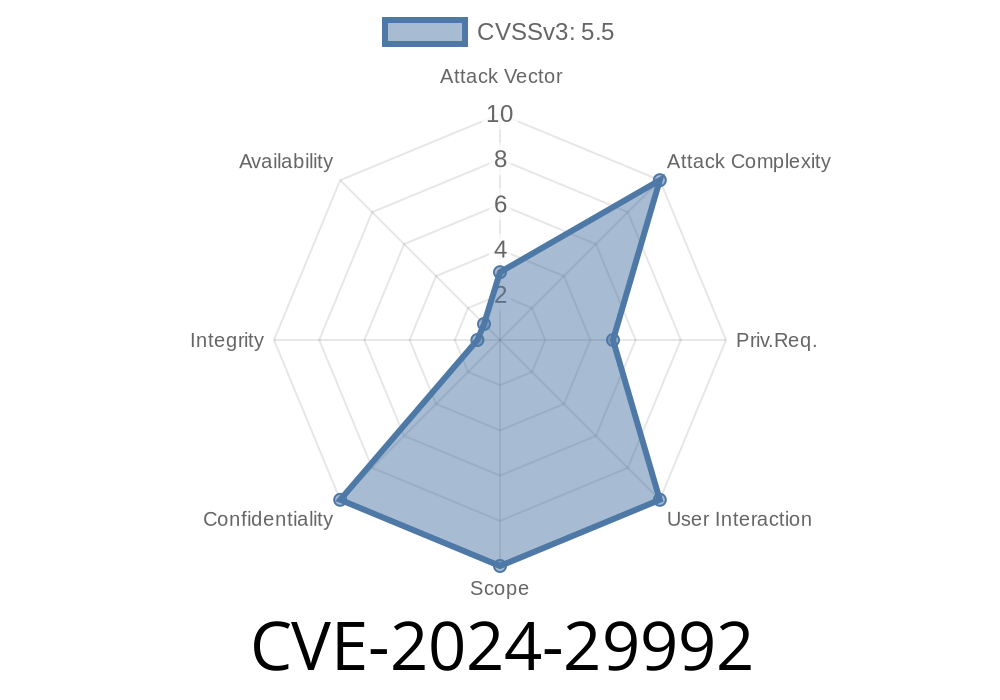The ever-evolving threat landscape makes cloud security a moving target. The discovery and public disclosure of CVE-2024-29992 — an information disclosure vulnerability in the Microsoft Azure Identity library for .NET — sent fresh waves across developer and security communities this year. In this in-depth article, we’ll break down what CVE-2024-29992 is, why it matters, see a simplified code example, and discuss real-world risks and mitigation. We’ll also share the best original references if you want to read further.
What is CVE-2024-29992?
On April 9, 2024, Microsoft announced a vulnerability impacting specific versions of the Azure.Identity NuGet package for .NET and .NET Core applications. If you’re using Azure Identity to authenticate apps with Azure AD, this issue could leak sensitive authentication-related information under certain error conditions.
Vulnerability Type: Information Disclosure (CWE-200)
> *“A potential information disclosure vulnerability exists when Azure Identity library for .NET improperly handles error details during authentication failures. This may result in sensitive data being exposed in error messages or logs.”*
> — Microsoft Security Response Center (MSRC)
Common Usage in .NET
using Azure.Identity;
using Azure.Security.KeyVault.Secrets;
Many app services, APIs, microservices, and Azure Functions use this library to obtain tokens, connect to Key Vault, Cosmos DB, and more.
How Does the Vulnerability Work?
The Azure Identity library helps apps authenticate to Azure (using secrets, certificates, managed identity, etc.). If authentication fails, the library throws exceptions such as AuthenticationFailedException. Earlier vulnerable versions included key details like request IDs, error descriptions, even parts of credentials embedded in these exception messages.
If your app logs these exceptions without scrubbing details, sensitive data is at risk. Attackers with access to log files may find credentials, tenant IDs, or details that should remain private.
Exploiting CVE-2024-29992: A Code Example
Let’s see what this looks like with a realistic code snippet.
Vulnerable code
using Azure.Identity;
using Azure.Security.KeyVault.Secrets;
try
{
var client = new SecretClient(
new Uri("https://myvault.vault.azure.net/";),
new DefaultAzureCredential());
var secret = client.GetSecret("MySecretName");
}
catch (AuthenticationFailedException ex)
{
// Unsafe: logging full exception
Console.WriteLine(ex.ToString());
// This can include sensitive data!
}
What’s wrong here?
If authentication fails (due to config error, expired credential, etc), the exception may include internal error details returned by Azure AD, e.g. request/trace IDs, or worse — secret fragments in rare edge cases.
A potential log dump
AuthenticationFailedException: ManagedIdentityCredential authentication failed.
Inner Exception: ErrorCode: invalid_client
ErrorDescription: The Client Secret contains invalid characters: XYZ123abc
TraceId: 9d8b...
RequestId: ab12...
Official References
- Microsoft CVE Disclosure
- GitHub Azure SDK Issue Tracker
- MITRE Entry for CVE-2024-29992
- NuGet Azure.Identity package
Upgrade Immediately
Upgrade Azure.Identity to at least version 1.10.3. The patched version cleans error messages and avoids emitting sensitive info.
or update in your csproj
Sanitize Logging
Always avoid logging full exception details or stack traces in production, especially from authentication paths.
catch (AuthenticationFailedException ex)
{
// Log only safe summary
Console.WriteLine($"Authentication failed for user: {ex.Message}");
}
Audit Existing Logs
Review logs for leaked information. Use log scanning tools for secrets, trace/request IDs, and Azure-related credentials.
Even non-remote vulnerabilities (i.e., 'just' information disclosure) can escalate in attack chains.
Stay vigilant—keep your dependencies, especially anything touching cloud authentication, up to date.
More to Read
- MSRC CVE-2024-29992 Full Advisory
- Azure.Identity Release Notes
- Secure Logging: Don’t Log Secrets
If you need more exclusive, practical code samples and best practice guides on cloud SDKs, subscribe to our newsletter below.
*Stay safe, patch early, and always treat your logs as potentially sensitive!*
Timeline
Published on: 04/09/2024 17:16:02 UTC
Last modified on: 04/10/2024 13:24:00 UTC
